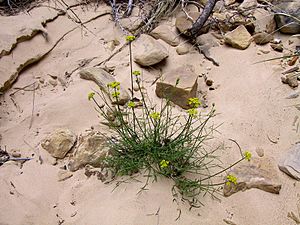Featherleaf springparsley facts for kids
Quick facts for kids Featherleaf springparsley |
|
|---|---|
 |
|
| Conservation status | |
| Scientific classification | |
| Kingdom: | |
| (unranked): | |
| (unranked): | |
| (unranked): | |
| Order: | |
| Family: | |
| Genus: |
Cymopterus
|
| Species: |
C. beckii
|
| Binomial name | |
| Cymopterus beckii S.L.Welsh and Goodrich
|
|
Cymopterus beckii is a very special and rare flowering plant. It's also known by common names like featherleaf springparsley or Beck springparsley. This plant belongs to the carrot family, which includes common plants like carrots and parsley! It is found only in certain parts of Utah and Arizona in the United States.
Contents
About the Featherleaf Springparsley
The featherleaf springparsley is a rare plant. This means there are not many of them left in the wild. It grows in specific areas of Utah and Arizona. Sometimes, you can find it in places like Capitol Reef National Park and the Abajo Mountains in Utah. It has also been seen in Navajo County, Arizona.
What It Looks Like
This plant is a perennial herb. This means it's a plant that lives for many years, not just one season. It grows from a special main root called a taproot. A taproot grows straight down into the ground, like a carrot. The plant can grow up to 40 centimeters tall. That's about the length of a ruler and a half!
Its Roots and Leaves
The leaves of the featherleaf springparsley are very interesting. They are divided into many smaller parts. These parts are also divided again, making them look very feathery. The very end parts of the leaves are narrow. They can also be different sizes.
Its Flowers
The plant produces clusters of yellow flowers. These flower clusters are called an inflorescence. They are shaped like an umbel, which looks a bit like an umbrella. These yellow flowers make the plant stand out in its natural home.
Where It Lives
The featherleaf springparsley likes to grow in a specific type of rock called Navajo Sandstone. You can often find it in sandy cracks and small spaces in these rocks. It usually grows near other plants. These include conifers, which are cone-bearing trees like pines. It also grows near manzanitas, which are a type of shrub.
 | Aaron Henry |
 | T. R. M. Howard |
 | Jesse Jackson |


